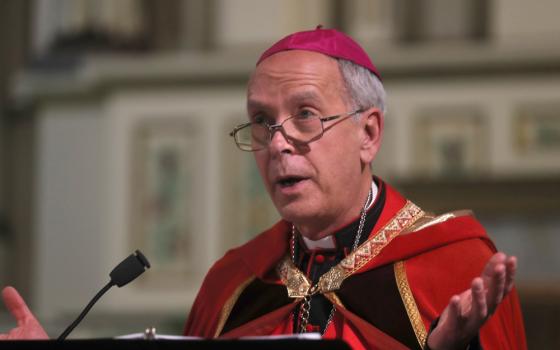You say, “I’m not religious, but I am spiritual,” and then I head to the bar. I’m not spiritual but I am religious.
I know people who “do” Hopi rituals when they raft the Colorado River. They want to get in touch with Hopi spirituality, something perhaps best done by living among Hopis on the Black Mesa reservation in Arizona. But that involves land disputes, poverty, and high rates of obesity and diabetes.
I know Gentiles who pray covered with a tallith. They want to get in touch with Jewish spirituality, something perhaps best done by living the Jewish life.
Here’s the problem for those of us who want only the spiritual life: The life of the spirit and the life of the body are one. Any attempt to separate one from another does violence to both.
Take the Eternal Word Television Network (EWTN), for instance. They televise several versions of the rosary daily. One is of Mother Angelica, back when she was ambulatory, leading the sisters in prayer. Her voice is pitched to that of a crabby neighbor yelling, “You kids get off my lawn.” If she had a Texas drawl, Mother A. would sound a bit like my mother when she barks, “Get me my cane.” This isn’t a beautiful sound but it is a real sound, a voice cracked and corroded by age, by life.
Then it comes time to introduce the next mystery, and a cultured British voice pipes up, all plummy clipped consonants and broad vowels. “The Lord,” God’s name pronounced with an ‘r’ that seems to melt into its surroundings, “is with thee.” The voice makes the angel sound like Queen Elizabeth opening Parliament.
Is an upper-class British accent holier? Is it something like the way Alistair Cooke’s sonorous introductions of “Masterpiece Theatre” made us feel farther from “Gilligan’s Island” and closer to art? Does it get us in touch with the spirituality of the rosary? Of Mary?
But the rosary is a plain prayer, a prayer for workers in fields and kitchens, offices and factories. It’s the regular guy’s Divine Office. It belongs to the woman on the bus with the shopping bags and the metal rosary ring, the sort of woman on whose aluminum siding Mary is most likely to appear. And it ought to sound like the people whose prayer it is, and not like the people whose prayer we wish it were.
The EWTN voice reminds me of the days when my soon-to-be husband was a student at the University of Notre Dame. We’d go to Mass there, the fit and young together, praising God. It was, I used to say to Martin, just exactly the body of Christ I would choose if I were in charge.
The Communion procession at my parish looks nothing like the one at Notre Dame. We’re a lumpy bunch, halt and awkward, weary and beloved. We don’t look like a recruiting poster for anything except, perhaps, mercy.
It is full-bodied spirituality, with a paunch and gel sole inserts.
My spiritual practices these days are bodily practices. I care for my small grandchildren -- keeping Lucy at home while her mother teaches, helping in Luc’s kindergarten class, reading aloud to Anna’s preschool class, driving to Denver for Eamon’s Grandparents’ Day -- and I care for my aged mother.
Digestion looms large. There are piles of soiled clothing to be washed. I check, and treat, a lot of rashes, bumps, bruises, cuts and swellings, some of them in embarrassing places. Though not, in truth, embarrassing for those in my care -- young and old -- who seem to share an Edenic view of nudity. Noses run and eyes tear and throats grow hoarse, and coughs, no matter how often I caution, “Turn away” and “Cover your mouth,” spew germs into the air like wedding rice. “Spit up” is a noun and a verb in my life.
I wipe faces, wrinkled and smooth. I speak softly to waking babies and loudly to my mother. I buy diapers in the widest possible range of sizes and shapes. I coax people born in different centuries on how to use the phone. Luc begins talking the moment I hand him the phone. I have to caution him to wait for someone to greet him. My mother looks confused at the phone-that-looks-nothing-like-a-phone in her hand and asks again, “What button do I push?”
I cook a dark green vegetable at every supper to help stabilize the Coumadin levels in my mother’s blood. I keep hot dogs in the freezer and rice cereal in the cupboard and bananas in the fruit bowl. Food for the toothless and the almost so.
I try to be patient. I try to be cheerful. I try not to overuse chips and salsa as psychotropic medication. I ask for help to see my mother through God’s eyes and not my own. I ask for wisdom.
At the end of this month, my oldest sister and I are taking our mother to Muleshoe, Texas, to visit her sole surviving sibling. My sister says it will be “Thelma and Louise Drive Miss Daisy.”
I remind her that Thelma and Louise were last seen driving off a cliff.
It will not be a spirit quest, though it may turn into the clean, handicapped-accessible bathroom quest. It will not be a spiritual trip, but it will be a good trip. My mother and her sister will look at pictures and discuss, again, how mean Aunt Maxine was to Pa. I will wonder, again, about the statute of limitations on family wrongs, real and imagined.
And when my mother snaps, “Where is my purse?” in a tone that suggests I have stolen and hidden it, I will think of Mother A and the sisters praying the rosary, plain as mud fences, and I will be glad.
[Melissa Musick Nussbaum is a writer, speaker on church and liturgy, and coauthor, with Jana Bennett, of Free to Stay, Free to Leave: Fruits of the Spirit and Church Choice.]
Editor's Note: We can send you an e-mail alert every time Nussbaum' column, "My Table Is Spread," is posted to NCRonline.org. Go to this page and follow directions: E-mail alert sign-up. If you already receive e-mail alerts from us, click on the "update my profile" button to add Nussbaum to your list.
After Pentecost, we bring you a week of Spiritual reflections
|


